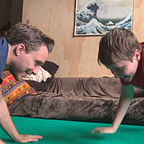Parents: Talk to your Kids about their Strengths and Limitations!
Today, I wanted to talk to you about building your kids’ abilities to accurately assess their strengths versus their limitations.
Think to yourself for a moment: can you think of a time when a kid came up to you and told you just how great they were at something? Now, think again and ask yourself, where are they actually that great at it? Or did they just believe that they were really good at it?
Knowing about your strengths and weaknesses is really important, because we want to be able to have accurate self perceptions. If we don’t, we can’t make responsible decisions. If I think that I can jump 20 feet standing and I try to do that and don’t make it, I could get severely hurt, especially if I’m off the ground. That is why I want to make sure that we have tools and systems for our kids. For example, if a kid wants to climb a tree but they can’t hold onto a branch, it’s unlikely that they’re going to stay safe. It’s important that we keep our students honest about their own perceptions and that we don’t allow for false perceptions to exist.
Typically there’s a couple of reasons why a student would have inaccurate self perceptions. One of those would be that they don’t want their ego to get hit. They don’t want people to see that they’re really bad at something. If I’m really boastful about it, then I have a mask that I can hide behind and I don’t have to worry about being found out by the people in my group.
Another reason why, and more commonly is something called the Dunning-Kruger effect.
Basically, it means that most people don’t have the ability to identify what they’re not good at. There’s a statistic that in America, 88% of drivers believe that they’re in the top 10% of their driving ability. Which does work because you can’t have 88% in 10%. You need to be able to identify those things and everyone has those limitations. Which is why it’s really important for loved ones to be able to help guide them into accurate self perceptions. This can be a hard thing to do, especially for kids because we want to be encouraging. One of the things that you can do is ask them to identify what is something they’re really good at. Then you can also ask them, what are things that they want to improve. It’s not asking them what they are really bad at, because we want them to know that they can improve. By asking them what they want to be able to improve, we can start to get their minds into thinking about things that they’re not good at yet.
Another thing that we can do for our kids is ask them how long they think something will take. For example, “How long do you think it will take for you to finish your chore?”, or homework or game. Whatever it is, they can start to build in these accurate assessments and perceptions of their ability to do something versus the reality of what it takes. It is another good way that you can lead your kid into understanding what their strengths and weaknesses are.
Lastly, and I think it’s the hardest one, is for a parent or a caregiver to not allow those false perceptions to exist. For example, I had a kid in my class who was really good at jumping. Or at least he thought he was really good at jumping. He came up to tell me how great he was. I had a relatively easy jump set up, for their skill and size. He wasn’t able to make it, but he was so adamant that he was really good. I would talk to him privately and say, “This jump looks like it’s really hard for you. You haven’t been able to make it yet.” and by calling it as you see it with empathy, you’re able to not allow those false perceptions to exist.
False perceptions can lead to a lot of hurt: physical and emotional.
We need to point out those false perceptions because we want our kids to be safe. More than that, we also want them to be able to make responsible decisions and they’re not going to be able to do that if they have inaccurate self perceptions of their abilities. Don’t allow for those perceptions to exist. Guide them to let them know that they can improve. If you lead with empathy and you give them faith that they can improve, if you encourage them to keep practicing, to keep learning, then it doesn’t matter about the current state. You demonstrate that you believe in them regardless of their current ability, and that’s going to be better for everyone in the long run.
Keep your kids safe by not allowing them to have a false perception of their strengths.
Three simple ways how to work on this with empathy and in a positive and constructive way:
- Ask them to identify what is something they’re really good at
- Ask them how long they think something will take
- Call our false perceptions with empathy and show them how to improve
Want to find out more about Kong Academy? Check out our website www.kongacademy.org
